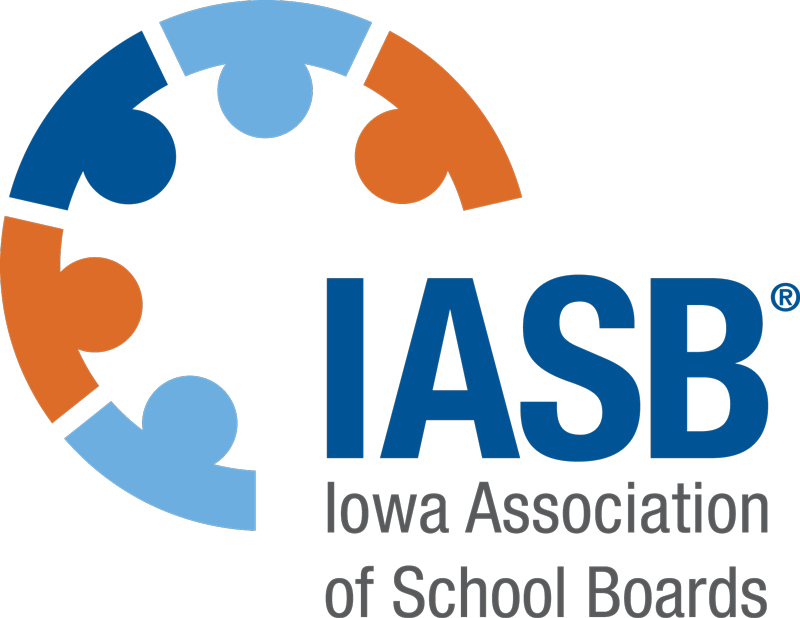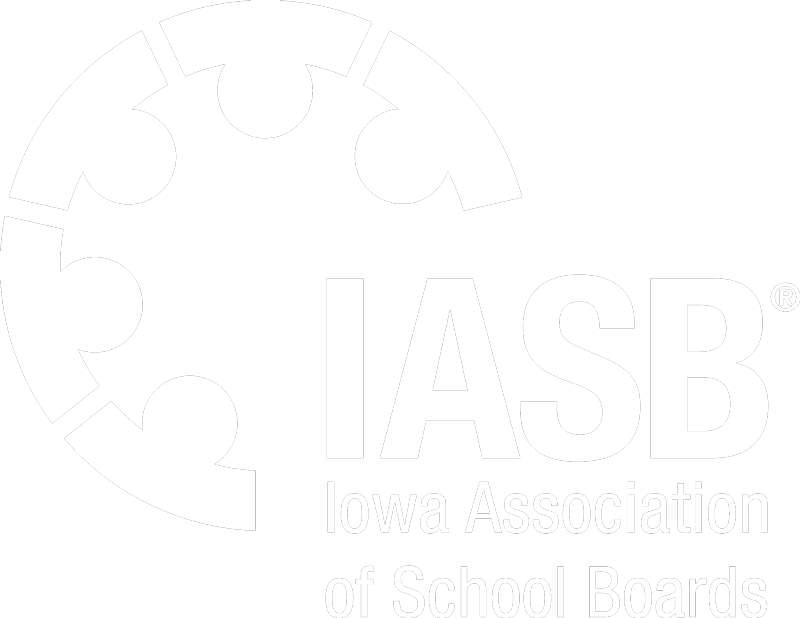Advocacy in Action
This page is your home for all things legislative and advocacy related. We have an update from our lobbyist at the Capitol each week, summaries of important bills, and then steps for you to get involved!
Contact Your Legislator
IASB®'s Public Policy Agenda
Iowa Legislature
2026 Bill Summaries
Under the Golden Dome
We are one week post-funnel, which means both chambers spent much of the week debating and passing bills. This is the next step in the legislative process as we move closer to the second funnel deadline. A few items of note from this week:
Governor Reynolds signed SSA into law on Thursday, Feb. 26. This officially establishes school funding for the upcoming year.
The Senate held a subcommittee on the governor’s property tax proposal. It is still unclear where we will end up on this issue, as there are still several plans under consideration.
On a positive note, the Senate passed a bill that would prevent students who are chronically absent from open enrolling. We’ve seen an increase in students attempting to avoid the penalties for absenteeism by using open enrollment, so this legislation is appreciated.
In a move we expected this session, the Senate passed a bill to require school districts to use E-Verify for all newly hired employees.
While new bill introductions have stopped, the legislature is still busy. Each chamber is passing bills they see as a priority in hopes that the other chamber will continue moving them through the process.
Under the Golden Dome Video
Advocacy Action of the Week
As the property tax conversation heats up as we move through session, be sure to have a conversation with your legislators to remind them:
How your board responsibly sets your overall tax rate.
The important uses of property tax revenue in your district. This could include using your PPEL for new equipment or technology or ensuring your management fund has enough money in the event you have a property/casualty claim.
Property taxes provide local control and more predictable funding.
We don’t know what the final bill will include, but the governor’s proposal does include using more SAVE dollars for property tax relief. Use our SAVE Revenue Loss Tool to show your legislator the negative impact of that idea.
SAVE Revenue Loss Tool
Governor Reynolds has released her property tax proposal. The bill is a fairly comprehensive change to the system and includes provisions related to school districts, most notably the amount of SAVE dollars that will be diverted to property tax relief through the Property Tax Equity and Relief Fund (PTER). Her proposal intends to increase the amount of SAVE revenue going to PTER to 30% by 2030. For comparison, 7% of SAVE revenue currently goes into PTER. To see the impact of this proposed legislation on your district, use our new SAVE Revenue Loss Tool.
Bills on the Move
SF 2412—E-Verify for New Employees: This bill would require school districts to use E-Verify to confirm the employment eligibility of newly hired employees. Someone can challenge the results from E-Verify within ten days if they provide proper documentation.
IASB is registered undecided on the bill. We appreciate that this is a way to protect districts while acknowledging that the E-Verify system is not perfect. The bill passed the Senate by a vote of 47-0.
SF 2086—Junior Firefighter Programs: This bill allows a school district to enter an agreement with their local fire department to offer a junior firefighter program to students in 11th and 12th grade. The bill outlines what the program must include if a district chooses to offer the program. It must be taught by fire service training bureau personnel.
IASB is registered in support of the bill. It gives districts the choice of whether to offer a program and doesn’t mandate it. The bill passed the Senate by a vote of 47-0.
SF 2351—Open Enrollment Denial for Chronically Absent Students: This bill allows a receiving district to deny an open enrollment request if the student is deemed chronically absent and currently required to participate in a school engagement meeting or absenteeism prevention plan. The student can transfer if the receiving district approves the request.
IASB is registered for the bill. We know some students are abusing the open enrollment process to avoid penalties for chronic absenteeism, and this helps to prevent some of that. Our hope would be to establish the same requirement for students requesting to open enroll to an online school. The bill passed the Senate by a vote of 44-0.
HF 2490—Public Notice Requirements: This bill would require districts to post a public notice in a place designated for notices that is visible at all times, like the door or window of an administrative building, and posting the notice on the district website. If a posted agenda is changed, the district must mark the agenda as “amended” and identify which agenda item has been changed.
IASB is registered undecided on the bill. This is best practice and already being done by most districts, so it won’t be a large burden moving forward. The bill passed the House by a vote of 88-1.
HF 2517/SF 2430—Flags at Half-Staff at School Buildings: This bill would require districts to fly the U.S. and Iowa flags at half-staff if directed to do so by a proclamation from the governor.
IASB is registered undecided on the bill. Districts are already doing this, but we want to ensure that an innocent omission, rather than purposeful, is not punished. HF 2517 passed the House Local Government Committee and SF 2430 passed the Senate by a vote of 38-9.
SF 2299—Payment for Failed Concurrent Enrollment Course: This bill would require a student or their parent to pay the school district the amount they spent on a concurrent enrollment course if the student fails the course.
IASB is registered undecided on the bill. We have concerns that this may dissuade students from enrolling in these courses but understand there should be accountability when students decide to take a community college class. It passed the Senate by a vote of 32-16.
HF 2493—Five-Year-Old Eligibility for Statewide Voluntary Preschool Program (SWVPP): This bill would allow a five-year-old, with a birthday between March 15 and September 15 of the school year in which they would be five, to enroll in preschool through the SWVPP. If the child attended preschool as a four-year-old and was counted for state, they would not be counted for state funding purposes as a five-year-old.
IASB is registered undecided on the bill. We think the SWVPP should prioritize four-year-olds but understand the need for some five-year-olds to have another year before kindergarten that isn’t available if a district doesn’t have a transitional kindergarten program. The bill passed the House by a vote of 88-2
HF 2294—Filing Complaints with IPIB: This bill extends the time period from 60 to 90 days for someone to file a complaint with the Iowa Public Information Board (IPIB) for an alleged violation of open meetings or open records laws.
IASB is registered undecided on the bill. It passed the House by a vote of 89-0.
HF 2330—Acknowledgement of Public Records Requests: This bill would require school districts to “promptly” respond to public records requests to provide an approximate date by which the records will be made available and inform the requester of any expected delays.
IASB is registered undecided on the bill. It passed the House by a vote of 89-0.
SF 2218—Verification of Employee Identity and Authorization to Work: The bill would require the Board of Educational Examiners (BOEE) to verify that an applicant for initial licensure is legally authorized to work in the U.S. Additionally, school districts must verify that employees are legally authorized to work in the U.S.
IASB is registered undecided on the bill. We appreciate the Senate amending the bill to the current “authorized to work” rather than the original “lawful presence” language, as this is a significant difference when referring to employment. The bill passed the Senate by a vote of 47-0.
SF 2219—Excused Absences for FFA and 4-H: This bill requires school districts to grant students an excused absence for FFA and 4-H activities. Districts must allow students to make up the classwork missed during these absences.
IASB is registered undecided on the bill. We think schools are already accommodating for these activities. We don’t like adding specific reasons for absences in code. The bill passed the Senate by a vote of 46-0.
HF 2547/SF 2223—Concurrent Enrollment: This bill removes the language that summer concurrent enrollment classes will be paid for subject to an appropriation. Instead, the summer courses will be included for weighting in the full school year’s calculation of students who took concurrent enrollment courses.
IASB is registered for the bill. We are supportive of all opportunities for students to take advantage of concurrent enrollment courses. SF 2223 has passed the Senate Education Committee and HF 2547 passed the House by a vote of 90-0.
SF 2224—Computer Science: This bill would allow courses in a variety of areas, including technology, engineering, or manufacturing, to meet the computer science offer and teach requirement. An amendment on the floor requires the instruction to include information on artificial intelligence.
IASB is registered for the bill. This offers flexibility to districts in how they meet the requirement to offer computer science instruction. The bill, as amended, passed the Senate by a vote of 47-0.
SF 274/HF 2247—Requiring Schools to Accept Cash at Events: This bill requires school districts to accept cash at athletic and extracurricular events hosted in their district.
IASB is registered undecided on the bill. We would prefer that this is a local decision and caution that dealing with cash can lead to misplaced funds or fraud. HF 2247 passed the House Education Committee and SF 274 has passed the Senate by a vote of 44-0.
Signed by the Governor
SF 2201—Supplemental State Aid (SSA): This is the updated deal made on SSA for this year. It includes:
2% increase in overall new money.
Budget guarantee covered by state aid for 199 districts that would be eligible at this SSA level. It amounts to $42.9 million.
Transportation equity; the payment to a district will be capped at $1 million.
Education support personnel salary supplement: $7 million
Establishes a second count date of Jan. 15. Districts would average their two enrollment counts to establish their basic enrollment.
State aid payments would be sent out quarterly, beginning in July.
IASB is registered undecided on the bill. We appreciate that this is higher than the Senate’s original proposal, but the overall funding is not enough to keep up with the increasing costs districts are facing, from utilities to meeting increased minimum teacher salaries. The bill passed the House by a vote of 58-35 and passed the Senate by a vote of 27-20. It was signed into law by Governor Reynolds on February 26.
15.3.2025.8

